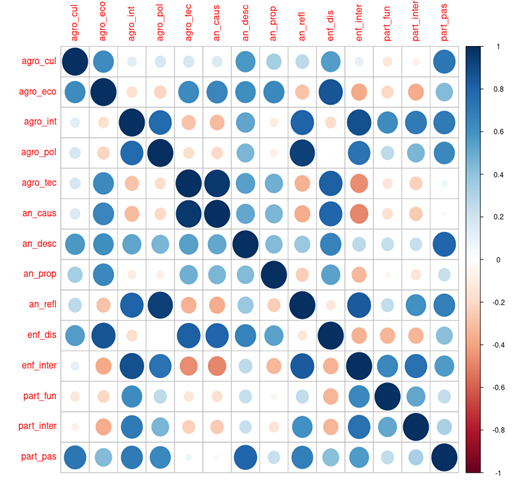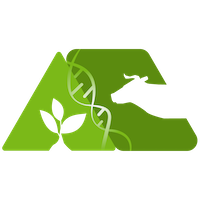Agroecology in Uruguay
characterisation of contributions at the 2020 Latin American Congress
DOI:
https://doi.org/10.31285/AGRO.26.971Keywords:
knowledge generation, Latin American Congress of Agroecology, knowledge networksAbstract
Agroecology is a broad discipline that is focused on analyzing the alimentary system in its political, multidimensional and multiscale way. The participation of Uruguay in the 8th Latin-American Congress of Agroecology 2020 has increased in comparison to previous congresses. In this occasion a total of 70 works were presented by Uruguayan's authors, while the average number of works in the last five congresses had been 22. In this frame, it is important to improve the analysis about the generation of knowledge on agroecology in Uruguay in order to drive the development of this discipline. In this article, we characterize the work presented by Uruguayan authors and develop a qualitative analysis of its contents using the following analytical categories: agroecology, participation, disciplinary and type of analysis. We registered a total of 191 authors. Most of the works were developed in a collaborative way; women were more productive than men. In the analytical category “agroecology”, we identified ecological, cultural, integral and technical approaches. In the disciplinary category we detected disciplinary as well as interdisciplinary approaches. In the participation category we detect two types: passive and interactive. Regarding the type of analysis most works were descriptive, followed by reflexive works. The relation between categories detected two main groups: A group formed by works with ecological and technical approaches developed in a discipline manner and with passive participation; another one containing integral agroecological works with interdisciplinary approaches. It is important to notice absences such as transdisciplinary, auto-mobilization and purposeful works, which generate new questions.
Downloads
References
Altieri M. La agroecología como alternativa sostenible frente al modelo de agricultura industrial. Real Econ. 2007;(229):75-93.
Bartra A. La gran crisis. Rev Venez Econ y Ciencias Soc. 2009;15(2):191-202.
Bastian M, Heymann S, Jacomy M. Gephi: an open source software for exploring and manipulating networks. In: Adar E, Hurst M, Finin T, Glance N, Nicolov N, Tseng B, editors. Proceedings of the Third International AAAI Conference on Weblogs and Social Media: 17-20 May 2009, San Jose, California, USA. Menlo Park: AAAI Press; 2009. p. 361-2. DOI: https://doi.org/10.1609/icwsm.v3i1.13937
Carrington PJ, Scott J, Wasserman S. Models and methods in social network analysis. Cambridge: Cambridge university press; 2005. 328p. DOI: https://doi.org/10.1017/CBO9780511811395
Delgado Cabeza M. El sistema agroalimentario globalizado: imperios alimentarios y degradación social y ecológica. Econ Crítica. 2010;(10):32-61.
Dumble S. RQDAPlus: Add-Ons for RQDA Through Shiny Interface. [place unknown: publisher unknown]; 2021. [cited 2021 Jun 21]. Available from: https://rdrr.io/github/sdumble1/RQDAPlus/
Freeman LC. Centrality in social networks conceptual clarification. Soc Networks. 1978;1(3):215-39. DOI: https://doi.org/10.1016/0378-8733(78)90021-7
Gazzano I, Achkar M, Apezteguía E, Ariza J, Alberto GP, Pivel J. Ambiente y crisis en Uruguay. La Agroecología como construcción contrahegemónica. Rev Ciencias Soc DS-FCS. 2021;34:13-40. DOI: https://doi.org/10.26489/rvs.v34i48.1
Giraldo OF. Ecología política de la agricultura. Agroecología y posdesarrollo. San Cristóbal de Las Casas: El Colegio de la Frontera Sur; 2018. 212p.
Gliessman SR, Rosado-May FJ, Guadarrama-Zugasti C, Jedlicka J, Cohn A, Mendez VE, Cohen R, Trujillo L, Bacon C, Jaffe R. Agroecología: promoviendo una transición hacia la sostenibilidad. Ecosistemas. 2007;16(1):13-23.
González de Molina M, Sevilla Guzmán E. Ecología, campesinado e historia para una reinterpretación del desarrollo del capitalismo en la agricultura. Madrid: La piqueta; 1993. 437p.
Herrero R. La terminología del análisis de redes: problemas de definición y de traducción. Polit y Soc. 2000;(33):199-206.
Huang R. RQDA: R-based Qualitative Data Analysis [Internet]. R package version 0.3-2. [place unknown: publisher unknown]; 2021 [cited 2021 Jun 21]. Available from: http://rqda.r-forge.r-project.org
Klein JT. A taxonomy of interdisciplinarity. In: Frodeman R, Klein JT, Mitcham C, editors. The Oxford Handbook of Interdisciplinarity. Oxford: Oxford University Press; 2010. p. 15-30.
López-García D, Pomar-León A, García-García V, Tendero-Acín G, Sampedro Y, Sastre-Morató A. Contradicciones en los saltos de escala: procesos participativos y planes de acción para la transición agroecológica en la escala metropolitana. Agroecología. 2018;13(1):33-45.
McMichael P. Global development and the corporate food regime. In: Buttle F, McMichael P, editores. New Directions in the Sociology of Global Development. Bingley: Emerald Group Publishing Limited; 2005. p. 265-99. DOI: https://doi.org/10.1016/S1057-1922(05)11010-5
Méndez EV, Bacon CM, Cohen R. Agroecology as a Transdisciplinary, Participatory, and Action-Oriented Approach. Agroecol Sustain Food Syst. 2013;37(1):3-18. DOI: https://doi.org/10.1080/10440046.2012.736926
Molina JL. El análisis de redes sociales: una introducción. Barcelona: Bellaterra; 2001. 123p.
Newman MEJ. Coauthorship networks and patterns of scientific collaboration. Proc Natl Acad Sci. 2004;101(Suppl. 1):5200-5. DOI: https://doi.org/10.1073/pnas.0307545100
Newman MEJ. Who is the best connected scientist? A study of scientific coauthorship networks. In: Complex networks. Berlin: Springer; 2004. p. 337-70. DOI: https://doi.org/10.1007/978-3-540-44485-5_16
Nuñez JF, Navarro-Garza H. La agroecología: Acercamiento a la dialéctica de una semántica marginal en América Latina: una breve historia en red. Redes. 2021;32(2):173-200. DOI: https://doi.org/10.5565/rev/redes.914
Pretty J. Regenerated Agriculture. Londres: National Academy Press; 1995. 336p.
R Core Team. R: A Language and Environment for Statistical Computing [Internet]. Vienna: R Foundation for Statistical Computing; 2021 [cited 2021 Jun 21]. Available from: https://www.r-project.org/
Sevilla Guzmán E. La participación en la construcción histórica latinoamericana de la Agroecologia y sus niveles de territorialidad. Política y Sociedad. 2015;52:351-70. DOI: https://doi.org/10.5209/rev_POSO.2015.v52.n2.45205
Sevilla Guzmán E. Sobre los orígenes de la agroecología en el pensamiento marxista y libertario. La Paz: AGRUCO; 2011. 168p.
Sevilla Guzmán E, Ottmann G. Agroecología como estrategia de recampesinización de la agricultura latinoamericana: hacia la otra modernidad. Rev umbrales. 2000;(8):22-51.
Sevilla Guzmán E, Soler Montiel M. Del desarrollo rural a la agroecología: hacia un cambio de paradigma. Doc Soc. 2009;155:23-39.
Tamayo y Tamayo M. El proceso de la investigación científica. 4a ed. Mexico: Limusa; 2004. 440p.
Toledo VM. El metabolismo social: una nueva teoría socioecológica. Relac Estud Hist y Soc. 2013;34(136):41-71. DOI: https://doi.org/10.24901/rehs.v34i136.163
Toledo VM, Gonzáles de Molina M. Metabolismos, naturaleza e historia: hacia una teoría de las transformaciones socio-ecológicas. Barcelona: Icaria; 2011. 376p.
van Eck NJ, Waltman L. Software survey: VOSviewer, a computer program for bibliometric mapping. Scientometrics. 2010;84(2):523-38. DOI: https://doi.org/10.1007/s11192-009-0146-3
Wasserman S, Faust K. Social network analysis: methods and applications. Cambridge: Cambridge university press; 1994. 825p. DOI: https://doi.org/10.1017/CBO9780511815478
Wei T, Simko V. R package «corrplot»: Visualization of a Correlation Matrix [Internet]. [place unknown: publisher unknown]; 2021 [cited 2021 Jun 21]. Available from: https://github.com/taiyun/corrplot.

Downloads
Published
How to Cite
Issue
Section
| Article metrics | |
|---|---|
| Abstract views | |
| Galley vies | |
| PDF Views | |
| HTML views | |
| Other views | |

















